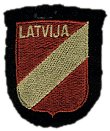20
In truth, there was a great difference between the Self-Defense and the Kartibas Dienests. A report from the head of Einsatzgruppe A to SS Headquarters explains that the Latvian Self-Defense was "totally useless for the fulfillment of police functions" (Document L-180, p. A of translation, p. 16 of German) and had to be reshaped into a useful unit by eliminating unreliable elements. In the first stage of the transformation, the Self-Defense (selbtschutz) became known as the Auxiliary Police (hilfspolizei). 30/ The Auxiliary Police had two major divisions: the Security Police (sicherheitspolizei, consisting of Political Police and Criminal Police) and the regular or uniformed police, of which the schutzmannschaft (in Latvian, Kartibas Dienests) was a part. Id.
The schutzmannschaft included a number of police battalions (military type formations of about 500 men each equipped as light infantry), harbor police, railway police, and a concentration camp administration of 880 men. 31/ As previously noted, its orders came from the SS and Police Leader for Latvia, Schroeder, and from his supervisor, Higher SS and Police Leader Jeckeln, who were Himmler's solution to the Jewish problem in the occupied eastern territories. Little wonder Hazners attempted to dissociate himself from the SS.
| 30/ | Id. They were also called security commandos (sicherheitskommandos) for a brief time, before being given the name Auxiliary Police. Id. |
| 31/ | Stipulation of May 19, 1979, attachment no. 2. |
Examination
From the alleged uselessness of the Selbstschutz to Latvians running Hitler's concentration camps, none of the INS's organizational contentions relate to Veiss' unit or Hāzners's service as his adjutant. We know the INS had Hāzners's service records and assume they had Veiss' as well. Instead, the INS invoked perceptions and roles of organizations and their war criminal leadership to smear Hāzners as their willing cohort.
The INS's guilt-by-association tactics reached their pinnacle nadir after losing the case against Hāzners. In the OSI's motion for appeal, Alan A. Ryan, Jr. petulantly insisted Hāzners was a war criminal because he was awarded the Iron Cross signed by Hitler.
